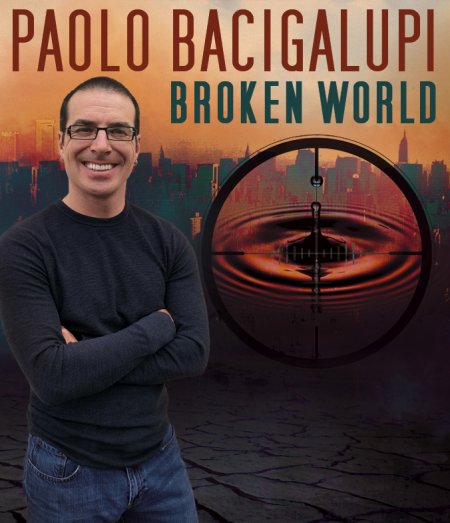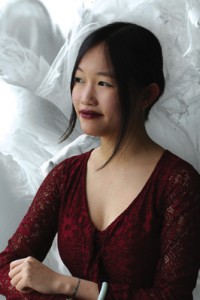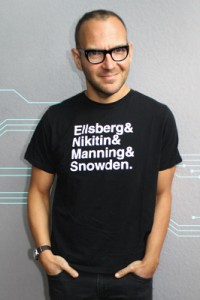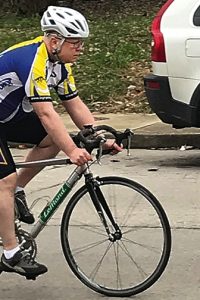Paolo Bacigalupi: Broken World

Paolo Tadini Bacigalupi was born August 6, 1972 in Colorado Springs CO, moving with his hippie parents to western Colorado soon after. They lived in a commune briefly and remained in the area afterward; when his parents divorced he split his time between them, going to various schools, finishing high school at the private Colorado Rocky Mountain School, where he learned the basics of writing. He attended Oberlin College in OH, where he met his wife-to-be Anjula (they married in 1998) and majored in East Asian Studies, spending time in China for foreign-language immersion. After graduating in 1994 he worked in China as a consultant, helping foreign companies enter the Chinese market. He returned to the US, and in 1996 worked for an early web development company in Boston. He and Anjula lived in Denver before returning to the small town of Paonia ten years ago, where they live with their son. Bacigalupi worked as the online editor for High Country News, a bi-weekly environmental newspaper in print and online, before becoming a full-time fiction writer.
Bacigalupi is a frequent contributor to F&SF, publishing his first story there, ‘‘Pocketful of Dharma’’, in 1999, though he first came to wide attention with Sturgeon finalist ‘‘The Fluted Girl’’ (2003) and Hugo and Nebula Award nominee ‘‘The People of Sand and Slag’’ (2004). His work has also appeared in Asimov’s, various anthologies, and High Country News. Other stories include ‘‘The Pasho’’ (2004); Hugo nominee and Sturgeon Award winner ‘‘The Calorie Man’’ (2005); ‘‘The Tamarisk Hunter’’ (2006); Hugo and Sturgeon Award finalist and Asimov’s Award winner ‘‘Yellow Card Man’’ (2006); ‘‘Small Offerings’’ (2007); ‘‘Softer’’ (2007); Hugo, Sturgeon, and Nebula Award nominee ‘‘The Gambler’’ (2008); and Nebula Award finalist novella The Alchemist (2011). Many of his stories were collected in Locus Award winner Pump Six and Other Stories (2008).
His first novel The Windup Girl (2009) was a huge critical and commercial success, named one of the top ten fiction books of the year by Time magazine, and won Hugo, Campbell Memorial, Compton Crook, Locus, and Nebula Awards.
First YA novel Ship Breaker (2010) won the Michael L. Printz Award, was nominated for the Andre Norton Award, was a finalist for the 2010 National Book Award for Young People’s Literature, and made the Top Ten Best Fiction for Young Adults list, presented by the American Library Association’s Young Adult Library Services Association. Sequel The Drowned Cities appeared in 2012, and a third volume in the series is forthcoming. He moved to middle-grade for Zombie Baseball Beatdown (2012), and back to YA for standalone SF The Doubt Factory (2014).
His latest adult novel is near-future thriller The Water Knife (2015).
Excerpts from the interview:
‘‘We’re a species that reacts to visceral stimuli. Whatever those visceral stimuli are, we take that as being the general state of the world. If it’s raining, it’s wet. If it’s a drought, it’s dry. We don’t take in things like ‘statistically, every year Lake Mead has gotten lower and lower.’ That’s not something you experience viscerally.
‘‘A lot of our problems stem from the fact that we’re a global species, and in order for us to gather information about the state of ourselves as a global species, we need to rely on data, rather than visceral experiences, to inform us about whether we’re proceeding in a way we like or don’t like.
‘‘You see the same thing when people talk about global warming, and they’re like, ‘It’s freezing where I am!’ Yeah, but that’s because there’s a polar vortex that’s shoving all of the cold air down to the United States when it should have been up at the North Pole, which is burning right now.
‘‘Again and again we take our localized, visceral experience of the data set and try to extrapolate that outward, and in reality we need to gather all of this general data from all over and use that, instead. It’s not what we’re built to do as a species. naturally.
‘‘Of course it would help if a bunch of corporations weren’t trying to muddy the waters by telling us the data isn’t true. The whole #ExxonKnew thing is a smoking gun. This major oil company decided it wasn’t profitable for us to believe in global warming, and so they decided to muddy up the science as much as they could, so that we’d all sit around being confused for a while, while they made billions and billions per year in profit. This company basically decided to put a stake in the heart of our children’s future. And we’ve pretty much accepted that – which is amazing in itself.”
…
‘‘In any universe where we as human beings were focused on being rational and effective, Trump would not be as successful as he is. Maybe what’s happening is we’re seeing how dumb we are. Society needs expert technocrats to run everything, because clearly we as a mass are just a mob.
‘‘I think a lot about mobs, and the excitement people get from being a part of mobs, across the political spectrum. I’m struck by our need to create mobs to reinforce our own values, so we feel extremely virtuous as we rip the fuck out of whoever we define as being outside of our in-group. I’m fascinated by that, and I feel like it’s getting uglier.
‘‘I think there’s something about social media that’s acting as gasoline for these big mob gatherings. The anonymity and the distancing that happens with the Internet is lubrication for viciousness. People like being able to look to their left and their right and say, ‘I’ve linked arms with others! I am part of something!’ Then everybody goes charging off to rip the fuck out of whoever doesn’t march down their particular moral corridor.
Anybody who’s outside of their moral structure must be the enemy. I’m fascinated by that. Again and again I see it.”
…
‘‘For The Water Knife, I just looked around at my local politics. I spent time immersed in the politics of water when I worked at High Country News. There’s stuff I was experienced with, with local water issues, and then there’s larger state-by-state issues, so I was aware of the general dynamics.
‘‘There are other things I specifically dragged in because I wanted those dynamics in the story. Rick Perry is a kind of a shit about immigration himself, so it was nice to make all Texans the new despised immigrants trying to get into other states. Here’s your rhetoric, let’s shove it back at you. Now you get to be that person.
‘‘A lot of things in the book are based on things I’ve noticed happening, and one of them is this huge push for state’s rights, this idea that the federal government is too powerful. These are the Cliven Bundys of the world: ‘I don’t even recognize the sovereignty of America! It’s never existed!’ That idea is rife throughout the western United States. That attitude and those crazypants ideas are common here, and they’re often coupled with the idea of states’ rights, the interior states especially.”
…
‘‘Talking about business is funny. There’s this thing authors do where they sort of flip their hair and say, ‘I’m just an artist. Business is hard.’ I hear it from authors all the time.
‘‘The interesting thing about that is everyone else in this industry is in business, so they’re going to fuck you up. I’m getting a little intolerant hearing author after author, or artist after artist, say, ‘Business is hard.’
‘‘Armor up, because bad people are out there, and they will fuck you in many different ways, and some of those will be career-ending ways. You won’t even see it happening until your career is just destroyed. Look around and see how many predators there are in the water around authors. It’s really important that authors start being aware of those things.
‘‘It’s weird because the tools we have and the information we trade are so limited. So many authors have saved my ass by telling me about things they learned in the business world. It’s been valuable to have so many people who were kind enough to share their experience with me, or give me a warning flag when they saw something going off the rails.
‘‘I want to emphasize that to authors. Make friends. Be kind to others. Ask questions. Share information. Always be willing to ask for guidance or another perspective. Be generous to others.”
Read the complete interview in the April 2016 issue of Locus Magazine. Interview design by Francesca Myman.





